Unit 1 What did you do this summer? Lesson 1 & Lesson 2 课件(共74张PPT)
文档属性
| 名称 | Unit 1 What did you do this summer? Lesson 1 & Lesson 2 课件(共74张PPT) |  | |
| 格式 | pptx | ||
| 文件大小 | 5.7MB | ||
| 资源类型 | 试卷 | ||
| 版本资源 | 北京版 | ||
| 科目 | 英语 | ||
| 更新时间 | 2023-07-25 08:49:11 | ||
图片预览

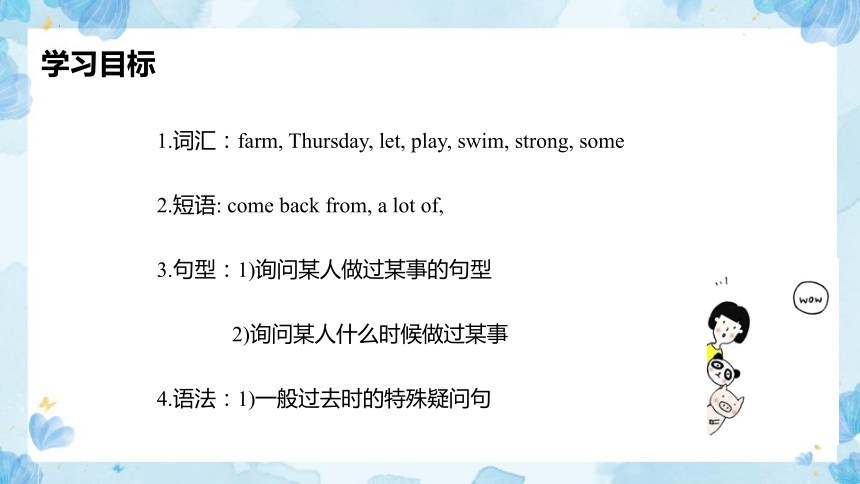
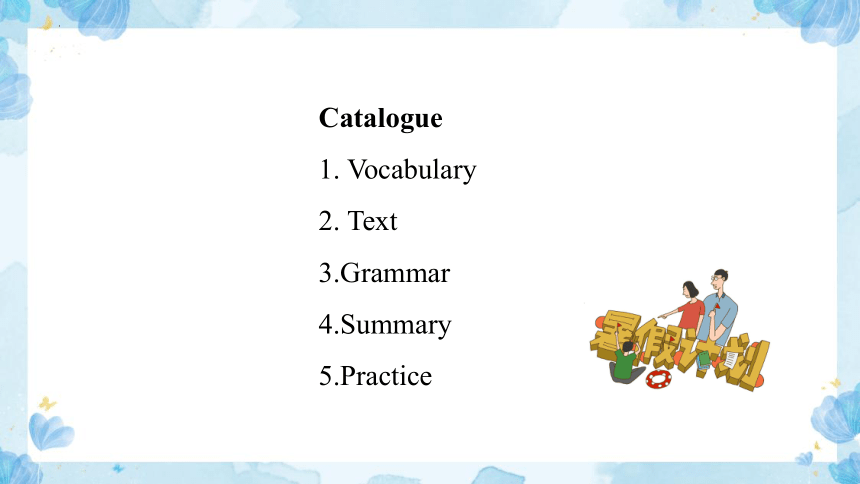
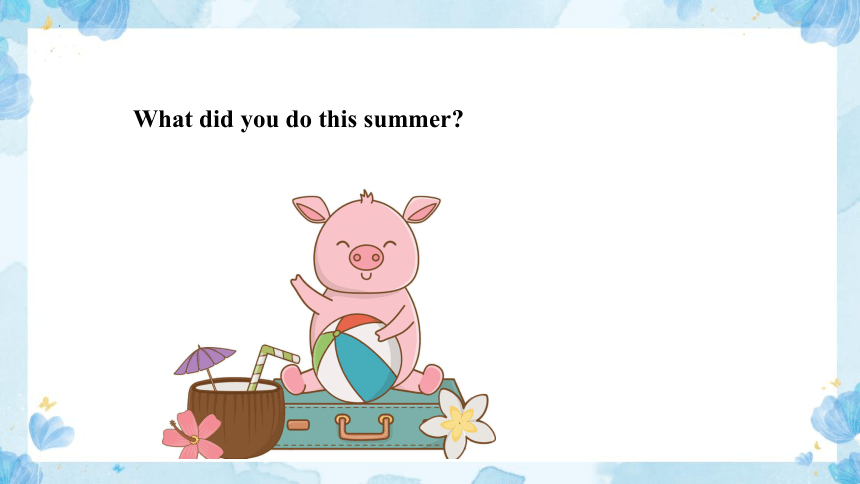
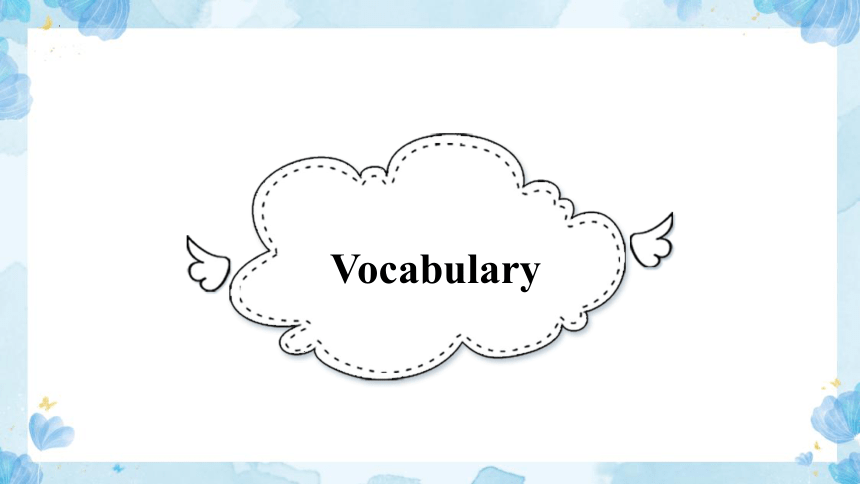
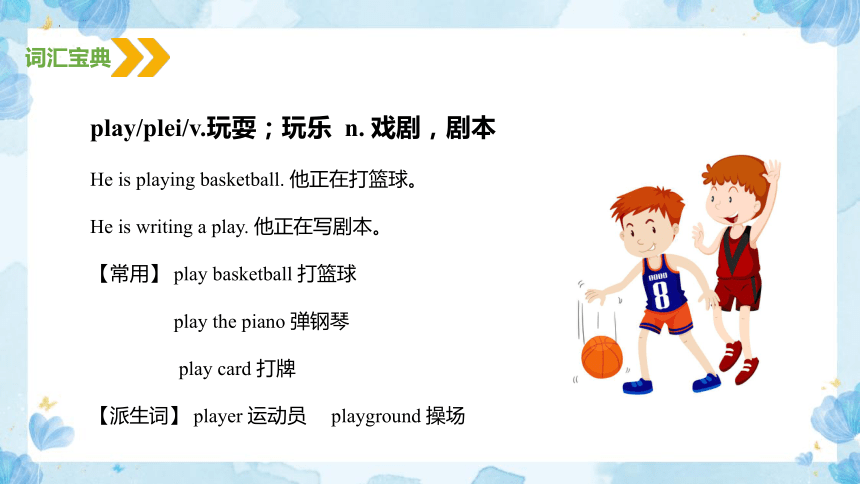

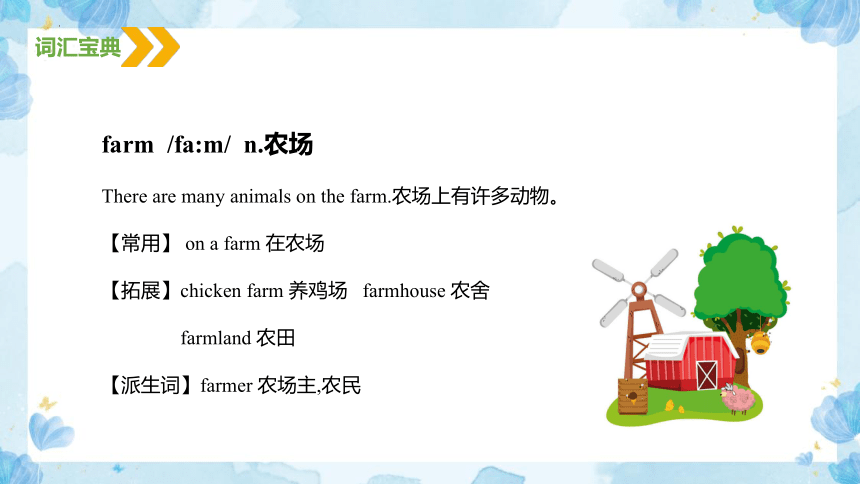
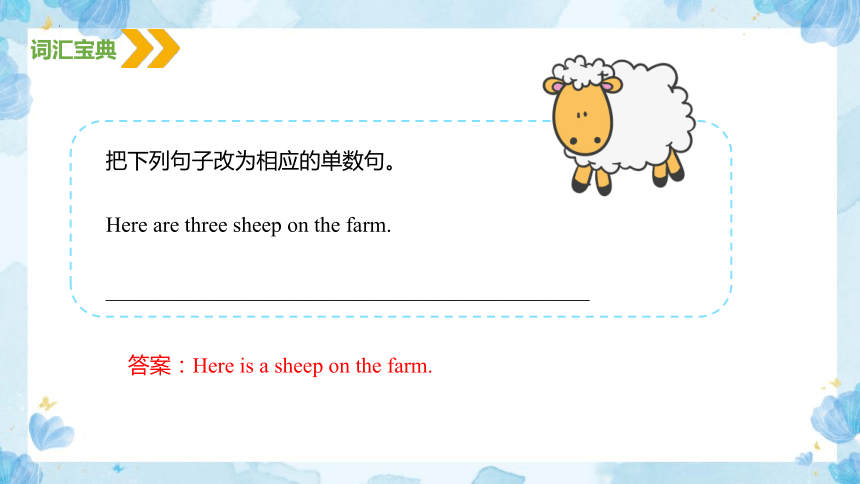
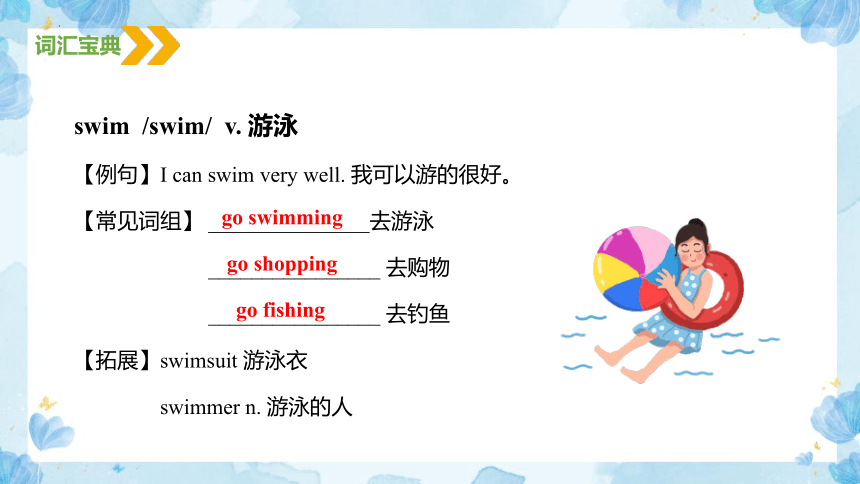
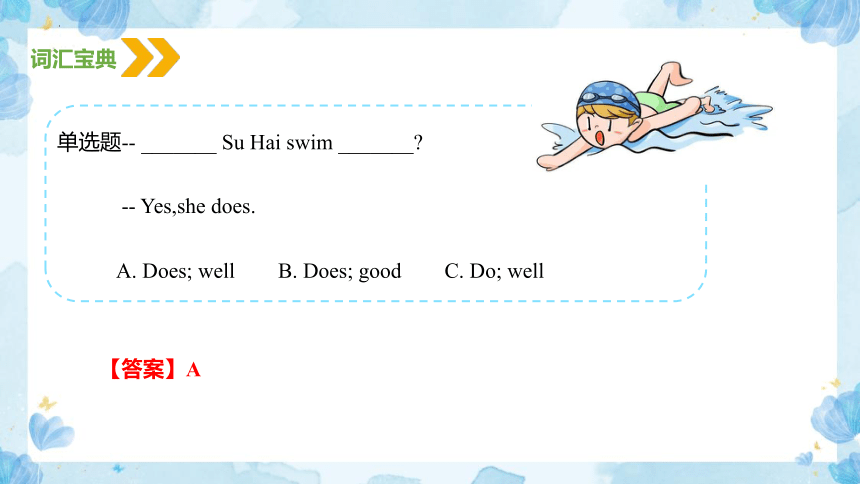
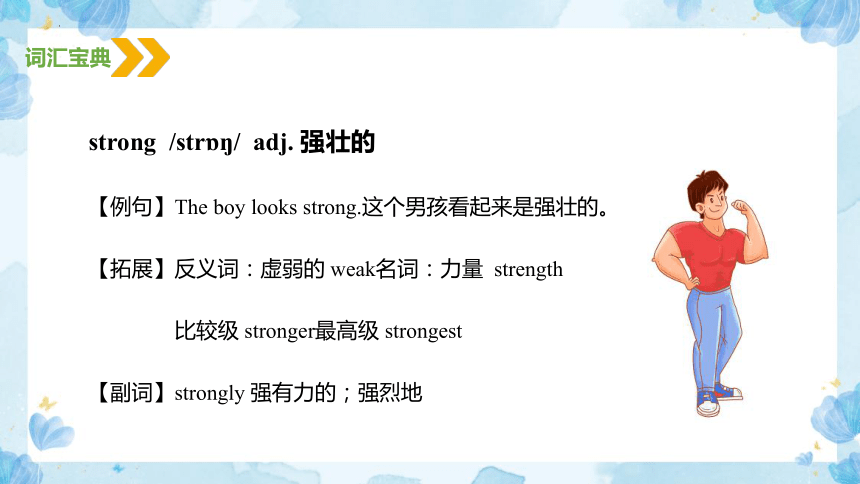
文档简介
(共74张PPT)
Unit 1 What did you do this summer
Lesson 1 - Lesson 2
1.词汇:farm, Thursday, let, play, swim, strong, some
2.短语: come back from, a lot of,
3.句型:1)询问某人做过某事的句型
2)询问某人什么时候做过某事
4.语法:1)一般过去时的特殊疑问句
学习目标
Catalogue
1. Vocabulary
2. Text
3.Grammar
4.Summary
5.Practice
What did you do this summer
Vocabulary
词汇宝典
play/plei/v.玩耍;玩乐 n. 戏剧,剧本
He is playing basketball. 他正在打篮球。
He is writing a play. 他正在写剧本。
【常用】 play basketball 打篮球
play the piano 弹钢琴
play card 打牌
【派生词】 player 运动员 playground 操场
单选题
After school we usually play _____ soccer for half _____ hour on ____ sports ground.
A. /; an; the B. the; a; the C. /; a;/ D. the; an; a
词汇宝典
【答案】A
词汇宝典
farm /fa:m/ n.农场
There are many animals on the farm.农场上有许多动物。
【常用】 on a farm 在农场
【拓展】chicken farm 养鸡场 farmhouse 农舍
farmland 农田
【派生词】farmer 农场主,农民
词汇宝典
答案:Here is a sheep on the farm.
把下列句子改为相应的单数句。
Here are three sheep on the farm.
_____________________________________________
词汇宝典
swim /swim/ v. 游泳
【例句】I can swim very well. 我可以游的很好。
【常见词组】 _______________去游泳
________________ 去购物
________________ 去钓鱼
【拓展】swimsuit 游泳衣
swimmer n. 游泳的人
go swimming
go shopping
go fishing
单选题-- _______ Su Hai swim _______
-- Yes,she does.
A. Does; well B. Does; good C. Do; well
词汇宝典
【答案】A
词汇宝典
strong /str / adj. 强壮的
【例句】The boy looks strong.这个男孩看起来是强壮的。
【拓展】反义词:虚弱的 weak名词:力量 strength
比较级 stronger最高级 strongest
【副词】strongly 强有力的;强烈地
单选题
Those trees are ________. They are stronger than _______.
A. Sarah, my B. Sarah's, my C. Sarah, mine D. Sarah's, mine
词汇宝典
【答案】D
词汇宝典
some /s m; s m/ pron. 一些
【例句】There are some trees in the garden.
花园里有些树。
形近:same相同的
转化: some adj. (形容词)相当多的;若干。
单选题
There is ______ tea in the bottle.
A. some B. any C. many
词汇宝典
【答案】A
词汇宝典
1. some用来修饰可数名词复数
e.g: some sandwiches
2.some用来修饰不可数名词
e.g: some water
词汇宝典
3. any用在否定句、疑问句中。
e.g. Do you have any balls
4. 肯定句中用some,但表示请求邀请委婉时,some可用于疑问句中。
句型 Would you... Can I... 只能用 some。
e.g. I have some pens.
Would you like some water
词汇宝典
单选题-- What would you like for your breakfast
-- I'd like to eat _____ egg and _____ bread.
A. some; some B. an; some C. a; a D. an; a
【答案】В
【分析】egg是可数名词,且以元音音素开头,而bread是不可数名词,一些面包是some bread,所以选B。
词汇宝典
Thursday / θ zde / n. 星期四
【例句】I didn't go to school on Thursday.
星期四我没有去上学。
【常用】 ______________ 在星期四
_______________ 上星期四
_______________ 下星期四
【缩写】 Thur.
on Thursday
last Thursday
next Thursday
单选题
Lucy ______ her homework after class last Thursday.
A. not did B. doesn't did C. didn't do D. isn't do
词汇宝典
【答案】C
星期及缩写
星期一 Monday Mon.
星期二 Tuesday Tues.
星期三 Wednesday Wed.
星期四 Thursday Thur.
星期五 Friday Fri.
星期六 Saturday Sat.
星期日 Sunday Sun.
词汇宝典
mountain / ma nt n/ n.山;山脉
【拓展】近义词 hill
mountaineer n.登山者
mountainous adj. 多山的
【构词法】记单词
mountain (山)+ous (形容词后缀)—多山的
【例句】There are many mountains here.这儿有很多山。
单选题
At the Spring Festival, people ____________.
A. eat rice dumpling B. eat jiaozi C. climb mountains
词汇宝典
【答案】B
【分析】在春节,人们吃饺子。
词汇宝典
let /let/ v. 让
【例句】Let him in.让他进来。
【短语】___________________ 让某人做某事
___________________ 使……失望
【常用】let go 松手,放弃
let into 让……进入
let sb. do sth.
let ... down
单选题
Let's ________ to work, class!
A . to get B. get C.gets
词汇宝典
【答案】B
【分析】Let's后跟动词原形。
Text
Lesson 1
文中探宝
Yangyang: Hi, Mike! What did you do this summer
Mike: Oh, I went back to Canada. I had a great time and did many things.
Yangyang: What did you do in Canada
Mike: Well, I visited my grandparents. I played with my friends. I worked on my uncle's farm. Where did you go, Yangyang
Yangyang: I just stayed in Beijing. I learned to sing Peking Opera in the morning and went swimming in the afternoon.
Mike: No wonder you look stronger.
Yangyang: Thank you. I also visited some museums and played with my cousins.
Mike: We both had an interesting vacation.
文中探宝
Yangyang: Hi, Mike! What did you do this summer
Mike: Oh, I went back to Canada. I had a great time and did many things.
Yangyang: What did you do in Canada
Mike: Well, I visited my grandparents. I played with my friends. I worked on my uncle's farm. Where did you go, Yangyang
Yangyang: I just stayed in Beijing. I learned to sing Peking Opera in the morning and went swimming in the afternoon.
Mike: No wonder you look stronger.
Yangyang: Thank you. I also visited some museums and played with my cousins.
Mike: We both had an interesting vacation.
回去
have a good time 玩的开心
难怪
两者都
go back to 回去
have a great time 玩得开心,过得愉快
visit my grandparents 看望我的祖父母
sing Peking Opera 唱京剧
go swimming 去游泳
no wonder 难怪,怪不得
visit some museums 参观博物馆
重点知识点
文中探宝
-- What did you do this summer
-- I went back to Canada.
Listen, look and learn
went back to Canada
回加拿大
wrote a stroy
写故事
made cakes
制作蛋糕
文中探宝
Listen and match
文中探宝
Let's do
Ask and write what your classmates did this summer.
Name Activity
Mike He went back to Canada.
Lesson 2
文中探宝
Baobao: When did you come back from your summer camp, Lingling
Lingling: I came back last Thursday.Baobao: What did you do there
Lingling: I climbed the mountains and I swam in the river. I went fishing one day and caught three fish.
Baobao: Really!
Lingling: I let them go back into the river again.
Baobao: Good for you! Was the camp very far
Lingling: No. It took only two hours by bus.
Baobao: So you had a lot of fun at the camp.
Lingling: Yes, I did.
文中探宝
Baobao: When did you come back from your summer camp, Lingling
Lingling: I came back last Thursday.
Baobao: What did you do there
Lingling: I climbed the mountains and I swam in the river. I went fishing one day and caught three fish.
Baobao: Really!
Lingling: I let them go back into the river again.
Baobao: Good for you! Was the camp very far
Lingling: No. It took only two hours by bus.
Baobao: So you had a lot of fun at the camp.
Lingling: Yes, I did.
从......回来
去钓鱼
爬山
一天
你真好
许多,大量
come back from... 从……回来
summer camp 夏令营
climb the mountains 爬山
swim in the river 在河里游泳
go fishing 去钓鱼
a lot of 许多,大量
have a lot of fun 玩的开心
重点知识点
文中探宝
-- When did you come back
-- I came back last Thursday.
Listen, look and learn
I / came back
she / finished the piano lessons
he / went to the airport
last week
Last Thursday
last Monday morning
文中探宝
Listen and number
文中探宝
Let’s do
Ask and write what your classmates did last week.
Activities
Mon.
Tue.
Wed.
Thur.
Fri.
Sat.
Sun.
Sentences
1.—What did you do this summer 你今年夏天干什么了?
— Oh, I went back to Canada.噢,我回加拿大了。
解读:这是询问某人做过什么的句型及其回答,是what引导的一般过去时的特殊疑问句。
举一反三:—What did you do last Thursday 你上星期四做什么了?
—I played football.我踢足球了。
Sentences
2.—When did you come back from your summer camp, Lingling
玲玲,你什么时候从夏令营回来的?
—I came back last Thursday. 我上星期四回来的。
解读:此句是when引导的一般过去时的特殊疑问句,用来询问某人什么时候做过某事。
举一反三:—When did you write the story 你什么时候写的这个故事?
—Last weekend. 上周末。
Sentences
3.—I let them go back into the river. 我又把它们放回河里了。
解读:这是描述让某人做某事的句型。
举一反三:Can you let me drink some orange
能让我喝些橙汁吗
Sentence
Sentence
My mum and I are going to New York.我和我妈妈要去纽约。
解读:这是用be动词+动词-ing形式表示将来的句子。
举一反三:Spring is coming. 春天就要来了。
Grammar
He was excited.
We had a good time.
How long did you stay in Beijing
Joe went to school yesterday morning.
Lily saw a film last night.
It was cloudy yesterday.
一般过去时
past now future
过去 现在 将来
①一般过去时表示过去某个时间里发生的动作或状态
Uncle Mike came here two hours ago.I saw him yesterday.
②一般过去时还可以表示过去习惯性、经常性的动作和行为
He used to do morning exercises.
一般过去时定义
一般过去时:
用法1:
1、过去某个时间发生的动作或存在的状态;
我刚刚拜访了我的朋友。
I visited my friend just now.
用法2:
2、过去习惯性经常性的动作行为;
我去年每周看一次电影。
I saw a film once a week last year.
用法3:
3、过去主语具备的能力和性格。
我10岁时会游泳。
I could swim when I was 10.
时间状语
动词过去时的变化-规则变化
一般过去时的句型
-What did+主语+ 动词原形+其他?
-主语+动词过去式+其他.
e.g.-What did you have for breakfast this morning
-I had some bread and milk.
-What did your mother have for lunch yesterday
-She had a sandwich.
一般过去时的句型
-When did +主语+ 动词原形+其他?
-主语+动词过去式+其他.
e.g.-When did you have breakfast this morning
-I had breakfast at 8 o'clock.
-When did your mother dance yesterday
-She danced at 4 p.m..
Practice
按要求写出下列动词的不同形式。
示例: play—plays—playing—played
1. swim —_____—_____—_____ 2. write —_____—_____—_____
3. buy —_____—_____—_____ 4. come —_____—_____—_____
5. make —_____—_____—_____ 6. go —_____—_____—_____
【答案】
1. swim—swims—swimming—swam
2. write—writes—writing—wrote
3. buy—buys—buying—bought
4. come—comes—coming—came
5. make—makes—making—made
6. go—goes—going—went
找出划线部分发音不同的单词。
( ) 1. A. box B. sir C. fox
( ) 2. A. seventy B. X-ray C. ox
( ) 3. A. box B. fox C. do
( ) 4. A. sixteen B. sixty C. ax
( ) 5. A. some B. Tuesday C. glasses
【答案】1. B 2. A 3. C 4. C 5. A
根据中文完成句子,每空一词。
1.我给奶奶买了一副眼镜。
I ____ a pair of _____ for my grandma.
2. 我想要他们品尝北京最好的食物。
I want them to enjoy ____ _____ food in Beijing.
3.坐车去学校只需要半小时。
It ____ me half an hour to go to school by ____.
根据中文完成句子,每空一词。
4.这个暑假我学习弹钢琴。
I ____ to ____ the piano this summer.
5.难怪你看起来更强壮了。
No wonder you ____ _____.
【答案】
1. bought glasses
2. the best
3. takes car
4. learned play
5. look stronger
用所给单词的适当形式填空。
1. The boy ____ (write) a story this summer.
2. What ___ (do) you ____ (do) last Sunday
3. Did you ____ (return) the books last week
4. Mike will ____ (go) back to Canada next month.
5. Look, Mary ______ (make) cakes.
【答案】1. wrote 2. did do 3. return 4. go 5. is making
按要求改写下列句子。
1. I finished the piano lessons yesterday.(就划线部分提问)
____ ____ you _____ yesterday
2. The man came back last Thursday. (改为否定句)
The man ____ _____ back last Thursday.
按要求改写下列句子。
3. We won the football match. (改为一般疑问句)
_____ you _____ the football match
4. Peking Opera, morning, I, sing, to, learned, the, in. (连词成句)
____________________________________________
5. you, tell, would, more, food, about, the, Beijing, please, me, in (连词成句)
____________________________________________
【答案】
1. What did do2. didn’t come3. Did win4. I learned to sing Peking Opera in the morning.5. Would you please tell me more about the food in Beijing
阅读下面的短文,判断句子的正(T)误(F)。
Sally’s old grandfather lived with her. Every morning he went for a walk in the park and came home at half past twelve for his lunch. But one morning a police car stopped near Sally’s house at twelve o’clock, and two policemen helped her grand- father to get out. One of them said to Sally, “The old man lost his way(迷路) in the park and called us for help, so we sent a car to bring him home.” Sally was very surprised (惊讶), but she thanked the policemen and they left. “But, grandfather,” she asked, “you go to the park every day for twenty years. How did you lose your way (迷路) ” The old man smiled and said, “I didn’t lose my way. I was just tired and didn’t want to walk home.”
( ) 1. Sally’s grandfather didn’t go for a walk in the park every morning.
( ) 2. One morning a police car stopped far Sally’s house.
( ) 3. Sally’s old grandma lost his way and called the policemen for help.
( ) 4. Sally thanked the policemen and they left.
( ) 5. The old man didn’t lose his way. He was just tired and didn’t want to walk home.
【答案】1. F 2. F 3. F 4. T 5. T
Summary
play, farm, swim, strong,
some, Thursday, let
What did you do this summer
I went back to Canada.
When did you come back
I came back last Thursday.I let them go back into the river.
一般过去时的特殊疑问句 what/ when
Vocabulary
Sentences
Grammar
Unit 1
Lesson 1 - 2
Unit 1 What did you do this summer
Lesson 1 - Lesson 2
1.词汇:farm, Thursday, let, play, swim, strong, some
2.短语: come back from, a lot of,
3.句型:1)询问某人做过某事的句型
2)询问某人什么时候做过某事
4.语法:1)一般过去时的特殊疑问句
学习目标
Catalogue
1. Vocabulary
2. Text
3.Grammar
4.Summary
5.Practice
What did you do this summer
Vocabulary
词汇宝典
play/plei/v.玩耍;玩乐 n. 戏剧,剧本
He is playing basketball. 他正在打篮球。
He is writing a play. 他正在写剧本。
【常用】 play basketball 打篮球
play the piano 弹钢琴
play card 打牌
【派生词】 player 运动员 playground 操场
单选题
After school we usually play _____ soccer for half _____ hour on ____ sports ground.
A. /; an; the B. the; a; the C. /; a;/ D. the; an; a
词汇宝典
【答案】A
词汇宝典
farm /fa:m/ n.农场
There are many animals on the farm.农场上有许多动物。
【常用】 on a farm 在农场
【拓展】chicken farm 养鸡场 farmhouse 农舍
farmland 农田
【派生词】farmer 农场主,农民
词汇宝典
答案:Here is a sheep on the farm.
把下列句子改为相应的单数句。
Here are three sheep on the farm.
_____________________________________________
词汇宝典
swim /swim/ v. 游泳
【例句】I can swim very well. 我可以游的很好。
【常见词组】 _______________去游泳
________________ 去购物
________________ 去钓鱼
【拓展】swimsuit 游泳衣
swimmer n. 游泳的人
go swimming
go shopping
go fishing
单选题-- _______ Su Hai swim _______
-- Yes,she does.
A. Does; well B. Does; good C. Do; well
词汇宝典
【答案】A
词汇宝典
strong /str / adj. 强壮的
【例句】The boy looks strong.这个男孩看起来是强壮的。
【拓展】反义词:虚弱的 weak名词:力量 strength
比较级 stronger最高级 strongest
【副词】strongly 强有力的;强烈地
单选题
Those trees are ________. They are stronger than _______.
A. Sarah, my B. Sarah's, my C. Sarah, mine D. Sarah's, mine
词汇宝典
【答案】D
词汇宝典
some /s m; s m/ pron. 一些
【例句】There are some trees in the garden.
花园里有些树。
形近:same相同的
转化: some adj. (形容词)相当多的;若干。
单选题
There is ______ tea in the bottle.
A. some B. any C. many
词汇宝典
【答案】A
词汇宝典
1. some用来修饰可数名词复数
e.g: some sandwiches
2.some用来修饰不可数名词
e.g: some water
词汇宝典
3. any用在否定句、疑问句中。
e.g. Do you have any balls
4. 肯定句中用some,但表示请求邀请委婉时,some可用于疑问句中。
句型 Would you... Can I... 只能用 some。
e.g. I have some pens.
Would you like some water
词汇宝典
单选题-- What would you like for your breakfast
-- I'd like to eat _____ egg and _____ bread.
A. some; some B. an; some C. a; a D. an; a
【答案】В
【分析】egg是可数名词,且以元音音素开头,而bread是不可数名词,一些面包是some bread,所以选B。
词汇宝典
Thursday / θ zde / n. 星期四
【例句】I didn't go to school on Thursday.
星期四我没有去上学。
【常用】 ______________ 在星期四
_______________ 上星期四
_______________ 下星期四
【缩写】 Thur.
on Thursday
last Thursday
next Thursday
单选题
Lucy ______ her homework after class last Thursday.
A. not did B. doesn't did C. didn't do D. isn't do
词汇宝典
【答案】C
星期及缩写
星期一 Monday Mon.
星期二 Tuesday Tues.
星期三 Wednesday Wed.
星期四 Thursday Thur.
星期五 Friday Fri.
星期六 Saturday Sat.
星期日 Sunday Sun.
词汇宝典
mountain / ma nt n/ n.山;山脉
【拓展】近义词 hill
mountaineer n.登山者
mountainous adj. 多山的
【构词法】记单词
mountain (山)+ous (形容词后缀)—多山的
【例句】There are many mountains here.这儿有很多山。
单选题
At the Spring Festival, people ____________.
A. eat rice dumpling B. eat jiaozi C. climb mountains
词汇宝典
【答案】B
【分析】在春节,人们吃饺子。
词汇宝典
let /let/ v. 让
【例句】Let him in.让他进来。
【短语】___________________ 让某人做某事
___________________ 使……失望
【常用】let go 松手,放弃
let into 让……进入
let sb. do sth.
let ... down
单选题
Let's ________ to work, class!
A . to get B. get C.gets
词汇宝典
【答案】B
【分析】Let's后跟动词原形。
Text
Lesson 1
文中探宝
Yangyang: Hi, Mike! What did you do this summer
Mike: Oh, I went back to Canada. I had a great time and did many things.
Yangyang: What did you do in Canada
Mike: Well, I visited my grandparents. I played with my friends. I worked on my uncle's farm. Where did you go, Yangyang
Yangyang: I just stayed in Beijing. I learned to sing Peking Opera in the morning and went swimming in the afternoon.
Mike: No wonder you look stronger.
Yangyang: Thank you. I also visited some museums and played with my cousins.
Mike: We both had an interesting vacation.
文中探宝
Yangyang: Hi, Mike! What did you do this summer
Mike: Oh, I went back to Canada. I had a great time and did many things.
Yangyang: What did you do in Canada
Mike: Well, I visited my grandparents. I played with my friends. I worked on my uncle's farm. Where did you go, Yangyang
Yangyang: I just stayed in Beijing. I learned to sing Peking Opera in the morning and went swimming in the afternoon.
Mike: No wonder you look stronger.
Yangyang: Thank you. I also visited some museums and played with my cousins.
Mike: We both had an interesting vacation.
回去
have a good time 玩的开心
难怪
两者都
go back to 回去
have a great time 玩得开心,过得愉快
visit my grandparents 看望我的祖父母
sing Peking Opera 唱京剧
go swimming 去游泳
no wonder 难怪,怪不得
visit some museums 参观博物馆
重点知识点
文中探宝
-- What did you do this summer
-- I went back to Canada.
Listen, look and learn
went back to Canada
回加拿大
wrote a stroy
写故事
made cakes
制作蛋糕
文中探宝
Listen and match
文中探宝
Let's do
Ask and write what your classmates did this summer.
Name Activity
Mike He went back to Canada.
Lesson 2
文中探宝
Baobao: When did you come back from your summer camp, Lingling
Lingling: I came back last Thursday.Baobao: What did you do there
Lingling: I climbed the mountains and I swam in the river. I went fishing one day and caught three fish.
Baobao: Really!
Lingling: I let them go back into the river again.
Baobao: Good for you! Was the camp very far
Lingling: No. It took only two hours by bus.
Baobao: So you had a lot of fun at the camp.
Lingling: Yes, I did.
文中探宝
Baobao: When did you come back from your summer camp, Lingling
Lingling: I came back last Thursday.
Baobao: What did you do there
Lingling: I climbed the mountains and I swam in the river. I went fishing one day and caught three fish.
Baobao: Really!
Lingling: I let them go back into the river again.
Baobao: Good for you! Was the camp very far
Lingling: No. It took only two hours by bus.
Baobao: So you had a lot of fun at the camp.
Lingling: Yes, I did.
从......回来
去钓鱼
爬山
一天
你真好
许多,大量
come back from... 从……回来
summer camp 夏令营
climb the mountains 爬山
swim in the river 在河里游泳
go fishing 去钓鱼
a lot of 许多,大量
have a lot of fun 玩的开心
重点知识点
文中探宝
-- When did you come back
-- I came back last Thursday.
Listen, look and learn
I / came back
she / finished the piano lessons
he / went to the airport
last week
Last Thursday
last Monday morning
文中探宝
Listen and number
文中探宝
Let’s do
Ask and write what your classmates did last week.
Activities
Mon.
Tue.
Wed.
Thur.
Fri.
Sat.
Sun.
Sentences
1.—What did you do this summer 你今年夏天干什么了?
— Oh, I went back to Canada.噢,我回加拿大了。
解读:这是询问某人做过什么的句型及其回答,是what引导的一般过去时的特殊疑问句。
举一反三:—What did you do last Thursday 你上星期四做什么了?
—I played football.我踢足球了。
Sentences
2.—When did you come back from your summer camp, Lingling
玲玲,你什么时候从夏令营回来的?
—I came back last Thursday. 我上星期四回来的。
解读:此句是when引导的一般过去时的特殊疑问句,用来询问某人什么时候做过某事。
举一反三:—When did you write the story 你什么时候写的这个故事?
—Last weekend. 上周末。
Sentences
3.—I let them go back into the river. 我又把它们放回河里了。
解读:这是描述让某人做某事的句型。
举一反三:Can you let me drink some orange
能让我喝些橙汁吗
Sentence
Sentence
My mum and I are going to New York.我和我妈妈要去纽约。
解读:这是用be动词+动词-ing形式表示将来的句子。
举一反三:Spring is coming. 春天就要来了。
Grammar
He was excited.
We had a good time.
How long did you stay in Beijing
Joe went to school yesterday morning.
Lily saw a film last night.
It was cloudy yesterday.
一般过去时
past now future
过去 现在 将来
①一般过去时表示过去某个时间里发生的动作或状态
Uncle Mike came here two hours ago.I saw him yesterday.
②一般过去时还可以表示过去习惯性、经常性的动作和行为
He used to do morning exercises.
一般过去时定义
一般过去时:
用法1:
1、过去某个时间发生的动作或存在的状态;
我刚刚拜访了我的朋友。
I visited my friend just now.
用法2:
2、过去习惯性经常性的动作行为;
我去年每周看一次电影。
I saw a film once a week last year.
用法3:
3、过去主语具备的能力和性格。
我10岁时会游泳。
I could swim when I was 10.
时间状语
动词过去时的变化-规则变化
一般过去时的句型
-What did+主语+ 动词原形+其他?
-主语+动词过去式+其他.
e.g.-What did you have for breakfast this morning
-I had some bread and milk.
-What did your mother have for lunch yesterday
-She had a sandwich.
一般过去时的句型
-When did +主语+ 动词原形+其他?
-主语+动词过去式+其他.
e.g.-When did you have breakfast this morning
-I had breakfast at 8 o'clock.
-When did your mother dance yesterday
-She danced at 4 p.m..
Practice
按要求写出下列动词的不同形式。
示例: play—plays—playing—played
1. swim —_____—_____—_____ 2. write —_____—_____—_____
3. buy —_____—_____—_____ 4. come —_____—_____—_____
5. make —_____—_____—_____ 6. go —_____—_____—_____
【答案】
1. swim—swims—swimming—swam
2. write—writes—writing—wrote
3. buy—buys—buying—bought
4. come—comes—coming—came
5. make—makes—making—made
6. go—goes—going—went
找出划线部分发音不同的单词。
( ) 1. A. box B. sir C. fox
( ) 2. A. seventy B. X-ray C. ox
( ) 3. A. box B. fox C. do
( ) 4. A. sixteen B. sixty C. ax
( ) 5. A. some B. Tuesday C. glasses
【答案】1. B 2. A 3. C 4. C 5. A
根据中文完成句子,每空一词。
1.我给奶奶买了一副眼镜。
I ____ a pair of _____ for my grandma.
2. 我想要他们品尝北京最好的食物。
I want them to enjoy ____ _____ food in Beijing.
3.坐车去学校只需要半小时。
It ____ me half an hour to go to school by ____.
根据中文完成句子,每空一词。
4.这个暑假我学习弹钢琴。
I ____ to ____ the piano this summer.
5.难怪你看起来更强壮了。
No wonder you ____ _____.
【答案】
1. bought glasses
2. the best
3. takes car
4. learned play
5. look stronger
用所给单词的适当形式填空。
1. The boy ____ (write) a story this summer.
2. What ___ (do) you ____ (do) last Sunday
3. Did you ____ (return) the books last week
4. Mike will ____ (go) back to Canada next month.
5. Look, Mary ______ (make) cakes.
【答案】1. wrote 2. did do 3. return 4. go 5. is making
按要求改写下列句子。
1. I finished the piano lessons yesterday.(就划线部分提问)
____ ____ you _____ yesterday
2. The man came back last Thursday. (改为否定句)
The man ____ _____ back last Thursday.
按要求改写下列句子。
3. We won the football match. (改为一般疑问句)
_____ you _____ the football match
4. Peking Opera, morning, I, sing, to, learned, the, in. (连词成句)
____________________________________________
5. you, tell, would, more, food, about, the, Beijing, please, me, in (连词成句)
____________________________________________
【答案】
1. What did do2. didn’t come3. Did win4. I learned to sing Peking Opera in the morning.5. Would you please tell me more about the food in Beijing
阅读下面的短文,判断句子的正(T)误(F)。
Sally’s old grandfather lived with her. Every morning he went for a walk in the park and came home at half past twelve for his lunch. But one morning a police car stopped near Sally’s house at twelve o’clock, and two policemen helped her grand- father to get out. One of them said to Sally, “The old man lost his way(迷路) in the park and called us for help, so we sent a car to bring him home.” Sally was very surprised (惊讶), but she thanked the policemen and they left. “But, grandfather,” she asked, “you go to the park every day for twenty years. How did you lose your way (迷路) ” The old man smiled and said, “I didn’t lose my way. I was just tired and didn’t want to walk home.”
( ) 1. Sally’s grandfather didn’t go for a walk in the park every morning.
( ) 2. One morning a police car stopped far Sally’s house.
( ) 3. Sally’s old grandma lost his way and called the policemen for help.
( ) 4. Sally thanked the policemen and they left.
( ) 5. The old man didn’t lose his way. He was just tired and didn’t want to walk home.
【答案】1. F 2. F 3. F 4. T 5. T
Summary
play, farm, swim, strong,
some, Thursday, let
What did you do this summer
I went back to Canada.
When did you come back
I came back last Thursday.I let them go back into the river.
一般过去时的特殊疑问句 what/ when
Vocabulary
Sentences
Grammar
Unit 1
Lesson 1 - 2
同课章节目录
- Unit 1 What did you do this summer?
- Lesson 1
- Lesson 2
- Lesson 3
- Lesson 4
- Unit 2 What happened to your neck?
- Lesson 5
- Lesson 6
- Lesson 7
- Lesson 8
- Unit 3 How did you go to Hangzhou?
- Lesson 9
- Lesson 10
- Lesson 11
- Lesson 12
- Unit 4 Revision
- Lesson 13
- Lesson 14
- Unit 5 When did the ancient Olympic Games begin?
- Lesson 15
- Lesson 16
- Lesson 17
- Lesson 18
- Unit 6 What is he wearing?
- Lesson 19
- Lesson 20
- Lesson 21
- Lesson 22
- Unit 7 What are the twelve animals?
- Lesson 23
- Lesson 24
- Lesson 25
- Lesson 26
- Unit 8 Revision
- Lesson 27
- Lesson 28
